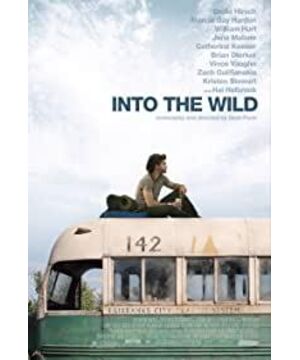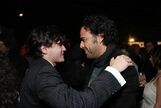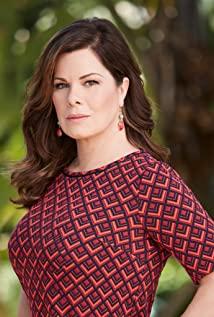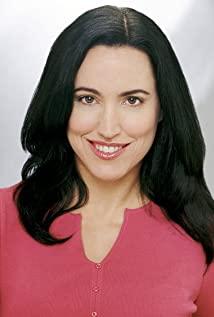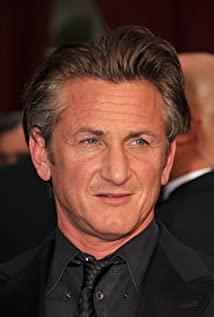The film is based on the documentary "Death in Alaska" by American writer Jon Collecau. ", and this book is based on real events - in 1992, in the wilderness of Alaska, a young corpse was found. The travel journal, written in three-person, contains fragmentary fragments of his life. At autopsy, the body was only 67 pounds, and the cause of death was starvation. Previously, the lone wanderer had survived alone in the Alaskan wilderness for 112 days. This is the prototype of the protagonist of the movie "Wild Survival" - American college student Christopher Johnson McCandless, a young talent from a famous university, the only child of a wealthy family, a man who has both body and soul. "On the Road" self-exile.
I have no way of knowing why the real Christopher Johnson McCandless chose this path in life, what he thought and felt, so I can only watch movies and let them lead the way , into the heart, interpretation of life.
The film begins with Chris entering the Alaskan wilderness. A set of fast-moving moving shots, accompanied by brisk and smooth music and the protagonist's narrative, begin the film's clear narrative. The image is frozen in an aerial shot. The long truck stops at a very narrow place on the left side of the image. The vast majority of the whole image is a small part of the wasteland covered with white snow. This extremely asymmetrical composition is an emphasis. , the vastness of the wasteland is already implied. The protagonist gets out of the car and starts walking alone. He accidentally finds an abandoned bus that can keep out the wind and rain, so he starts his life in the wasteland as he wishes... Then, the movie begins to trace back, his inner monologue at the college graduation ceremony, The quarrel that happened at his parents' banquet, his premeditated runaway, and his rich and wonderful wandering experience in the next two years... The film's narrative is interspersed with flashbacks between the real wasteland and the protagonist's past experiences. It confirms that the causes in the previous text illuminate the consequences behind, and the reality of the past is used to infer the right and wrong of the past thoughts. This kind of interlaced comparison tells clearly and powerfully. Structure, analysis and perspective, and we movie viewers, in the interpretation of the film, watch, stare, and compare ourselves...
Why did Chris take this unusual path? The movie traces back to its parents' marriage. The marriage, full of lies and disputes, did stab the child's tender heart. Perhaps from this moment on, the seeds of his hatred for hypocrisy and desire for truth were planted. After that, the movie did not describe it, but from his conversation with Wayne The clues can be seen in this, a young and vigorous child, a child who is good at thinking and has courage and strategy, is full of disappointment and hatred for the greed, falsehood, deceit, and intrigue between people in society, and then to domination, Judgment, all social and civilized systems have been questioned. Therefore, he resolutely chose a rather extreme way to break free - donated all his savings to charity, cut off all documents, abandoned the car representing modern civilization, and even burned all the cash - "Boundless Walking is always exhilarating, and in our minds it means forgetting the past, getting rid of stress, escaping from laws and burdensome obligations, absolute freedom, the road always goes west..." He broke free of everything: money, relationships, family , name, without hesitation toward an idealized absolute freedom.
The magnificent scenery between heaven and earth washes his soul, and the free creatures in nature comfort his soul, this is nature, this is reality. "A forest without a path is always fun; a shore without no one is full of surprises; where can one find a paradise; where to listen to the music, one must be in the sea; when I love the world, I love nature more." - Nature in Byron's Poems , Is the nature that Chris entered, the truth of "not love, not money, not faith, not reputation, not fairness, give me the truth"? —I'm still thinking, and Chris is convinced this is the answer he's looking for. He travels the world with the attitude of a walker. Carrying a huge bag, walking on foot, walking at sunrise, resting at sunset, eating in the wind, sleeping on the road, taking the road as home, sitting down wherever you are when you are tired of walking, sometimes shaking your thumb to hitch a ride, sometimes picking up the train to travel the world, he Always walking on the road, sometimes he also thinks, but more of an experience, looking at the untouched mountains, fighting in the turbulent torrent... Free as a cloud, as unruly as the wind, simply living in the sun is What a beautiful, fascinated wandering!
Could it be that he has always been so determined to wander and never tire? He also quietly returned to the familiar reinforced concrete jungle. Indifference, restlessness, suspicion, like a lingering black cloud covering the city, beggars sleeping on the streets, crowded and expressionless passers-by, people addicted to money and money hitting his heart again and again, making him sensitive and thoughtful. , made him feel uneasy, made him feel at a loss, he could not accept the imaginary well-dressed and indifferent self, and he could not accept the suppression of survival under the shackles of the system.
Could it be that he has always been so stubborn in abandoning the family and family in the world and has never thought about his relatives? He also tried to contact his family, but the innate separation between people hindered him. When family affection and ideals could not be balanced, he once again gave up family affection and ran towards ideals. Even the friendship with a middle-aged couple, even the kinship with a widowed veteran, and even the love of a gypsy girl that gradually rippled in his heart, could not stop him from moving forward. If you think that happiness in life mainly comes from relationships, then you are very wrong. God gives happiness to all things in the world. Happiness is everywhere. We can experience happiness from all things. What we have to do is to change us. way of looking at things". He doesn't believe that "only if you learn to forgive, you will love, and only if you love, the light of God will shine on you". He did not compromise on worldly favors, and he set his heart on the long-awaited holy land - Alaska.
Why did he have to go to Alaska? Because it is a wasteland, silent, vast, uninhabited, isolated from the world, this is the ideal anchorage for wanderers, and this is the holy land for pilgrims to worship. When he first entered the wasteland, he looked at him and observed what he was experiencing. He was novel, he was excited, he felt an unprecedented satisfaction, aiming at the prey, he was soft-hearted, facing the scenery, he raised his arms and shouted "Is there anyone?" Only the Stormrage Pine, he indulged in it... Gradually, hunger began to follow him, and he had to tighten his belt again and again. The harshness of human nature revealed his true colors. He ran for survival, but nature had its irresistible nature. Will, it is eternal and vague, quiet and cold, it is not moved by people, and it does not show tenderness because of your passion. Is this the truth he yearns for?
"I have gone through all the things in the world, and now I have finally found the place of happiness, hiding in the countryside, helping those who can help, helping those who are helpless, doing good deeds, self-cultivation, enjoying the landscape, boating on the sea of books, singing and traveling around the world, among the neighbors. This is my ideal happiness, and the most important thing is that I have you as my company, maybe a child, if so, what can I ask for?" - When he read Leo Tolstoy's this With a bright smile on the corner of his mouth, he suddenly realized another meaning of the word people, so he decided to leave the wasteland, with a belief that maybe he would throw himself into the world-but the boundless raging waves blocked him, The river at the high tide of spring has become a moat, and will forever block his connection with the world. He had to go back to the bus and for the first time wrote "lonely" and "horrified" in the manuscript.
He was getting more and more hungry, he was skinny, described as withered, he was trapped on a desert island, and finally realized that he was not far from the end, and he wrote the words "only sharing can bring true happiness". He was full of hot tears, seemingly unwilling, but also seemed satisfied. Staring at the sparse blue sky and white clouds, he suddenly thought, what would happen if he ran to his parents' arms? Is it possible to meet such a clear sky?
He died, leaving the words: "I lived a happy life, thank the Lord, farewell, and God bless you!"
An idealist died. Where did he go? Will he know the grief of his relatives? Will he know the memory of the living? Will he care about the evaluation of future generations? How does he evaluate whether he has been unwilling and regretful for his actions? If there is an afterlife, could he live in a different way?
The movie is over, but my thinking has not stopped.
I was thinking, if I could escape from the wasteland, this Chris would throw himself into the mundane world and embrace family love? If he continues to walk, where will this walk end, when will he put down his bags, and where will he end up? If he returns to society and civilization, how will he live, and how will he face the inevitable lies and evil deeds in society?
I also thought, his life is only for ideals, is this feasible? No responsibility, no obligation, abandoning family affection, staying away from the mundane world, just to realize one's own ideals - is this selfishness or perseverance? Can we all use ideals as a reason or excuse to act arbitrarily, as long as we have the courage, determination and perseverance to do it?
I thought again, was his death worth it? The young and strong life is only 24 years old, gradually withering in the torment of hunger, just to insist on realizing the ideal-a belief that cannot be proved correct or false. Is such a death too cruel, and is there any justification for such persistence?
I'm still wondering, is the truth he insists on correct? Isolation from the world, far from civilization, denying everything about this filthy society, erasing all social characteristics of human beings, and only taking the simple life of a pure human being in the embrace of nature as the full meaning of human existence—are these correct?
I don't agree.
The truth, in addition to the true nature of all things in nature, also includes people themselves, people's behavior, language, thoughts, ideals, desires... all are true, although they may not be true. Does it really have to be true? Is it not true that the illusory, such as desire, such as dreams? Everything is true, even if it is deceitful and false, this is the truth. Why seek outside, why seek things? As long as you have a broad heart, learn to forgive, learn to tolerate, get rid of the bad and keep the good, and keep the truth behind, the world will be open and clear. The wasteland can be stored in the heart, no matter how big the wasteland can be. Although the flow of people is like a flood of material desires, as long as the wasteland is in the heart, the soul can be as quiet and peaceful as the wasteland.
Alas, maybe this is the excuse of a smooth person, maybe this is a cowardly excuse of a worldly person, I am already a worldly person walking on the road of realism with ideals, all my words and thoughts have been branded with compromises. brand.
However, I still want to pay deep respect to Christopher Johnson McCandless, the idealist who died suddenly, the world is so vast because of you, and lonely because of you Empty!
View more about Into the Wild reviews


